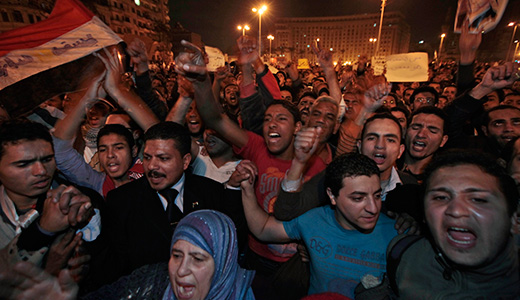
U.S. and European military leaders will meet in Chicago May 20-21 for their NATO summit. A Counter-Summit for Peace and Economic Justice will convene May 18-19. A timely new book, “Arab Spring, Libyan WInter,” provides a short, information-rich guide to what the NATO controversy is all about. Its focus is the upheavals in the Middle East and North Africa over the past year, but the insights are relevant far beyond.
Author Vijay Prashad, professor and director of international studies at Trinity College in Hartford, Conn., will be a speaker at the Counter-Summit.
In “Arab Spring, Libyan Winter,” Prashad draws on his extensive contacts in the region and the diplomatic community, as well as sources such as the Wikileaks State Department cables, to provide unique information about how the “Arab Spring” emerged in Tunisia, Egypt, Bahrain, Yemen and Libya, who and what has driven it, and the damaging role of the U.S., other Western powers, and Saudi Arabia. In all these cases Prashad gives a balanced overview of the history of imperialism and of national liberation efforts and missteps.
Prashad closes his book with a story. In the 1970s Chinese Prime Minister Zhou en-Lai was reportedly asked his assessment of the French Revolution of 1789. Zhou’s reply: “It’s too soon to tell.” Prashad’s point: It’s too soon to tell what the impact of these Middle East/North Africa revolutions will be, but some things are sure:
* The time of the “neoliberal security state,” exemplified by Mubarak’s repressive U.S.-propped regime (and Qaddafi’s in its later incarnation), is over.
* A key failure of the “national liberation” states that emerged in the 1950s-1970s, such as Nasser’s Egypt (and Qaddafi’s regime in its earlier years, and Syria’s Assad regime), was their dismissal of popular democratic aspirations, their anti-communism, and their reliance on military and police repression. The time of such states, too, is over.
The heart of the book is the overthrow of Libya’s Qaddafi regime. It’s a cautionary tale, he says, for other potential U.S.-NATO “humanitarian interventions,” such as in Syria.
“By early March [2011], the Libyan rebellion began to be hijacked by forces close to the Atlantic powers, whose interest in Libya is governed by oil and by power,” Prashad writes.
“[T]he Libyan rebellion gave the Atlantic powers and Saudi Arabia an opportunity to attempt to seize control over an escalating dynamic that had spread across the Middle East and North Africa.” Why? Because the democratic and economic and social justice uprisings “threatened the U.S. pillars of stability and the foundation of Saudi rule.”
The United Nations resolution backing intervention in Libya was based on the UN’s earlier statement of a “collective international responsibility to protect” civilians “in the event of genocide and other large-scale killing … or serious violations of international humanitarian law.”
But even countries who voted for that resolution, or abstained, became outraged that the military intervention far exceeded the “responsibility to protect” mandate. Prashad emphasizes that while the Qaddafi regime committed serious crimes against its people in violation of international law, their extent was exaggerated by foreign intervention advocates. Moreover, NATO’s actions also included such violations but it is strenuously fighting efforts to investigate this.
In a recent article, Prashad writes that NATO “operates as a rogue military entity” outside the bounds of democratic control. “It is precisely because NATO refuses an evaluation that the UN Security Council will not allow another NATO-like military intervention,” he says. “Libya is the shadow that hangs over Syria.”
After reading this thought-provoking book, we are left with the question of how to view the Obama administration’s foreign policy, particularly in this election year.
What we are seeing now within this administration, it seems, is liberal defenders of capitalism seeking how to project and protect what they call “U.S. interests” globally in the post-Iraq era.
Clearly some within the administration define U.S. interests as the interests of U.S. transnational capital, and others may think in terms of economic or social justice as being in the U.S. interest.
Obama has so far resisted the far-right push for military attacks on Iran, and has continued to press for global nuclear disarmament, including signing the NEW START treaty with Russia.
However it seems that his administration is opting for projecting U.S. military power in key areas but through means that do not involve “boots on the ground” but rather what Prashad calls “boots in the air” – drones, air strikes and the like. The “humanitarian intervention” appeal, as in Libya, easily morphs into political-military projects that are destructive of the interests of the people of the country in question as well as our own. To steer clear of the discredited Bush unilateralism, NATO is being used as a cover.
On domestic issues, this administration is one of the most progressive since Franklin Delano Roosevelt. But on foreign affairs, which way will Obama go in a second term? The American peace movement is not yet big and broad enough to compel a turn away from dangerous military policies that drain our tax dollars. But the potential is there. “Arab Spring, Libyan Winter” is a thoughtful, informative contribution to this project.
Book information:
“Arab Spring, Libyan Winter”
by Vijay Prashad
2012, AK Press, paperback, 168 pages, $14.95
Photo: Protesters fill Tahrir Square in downtown Cairo on Sunday, Jan. 30, 2011. (AP/Lefteris Pitarakis)












Comments